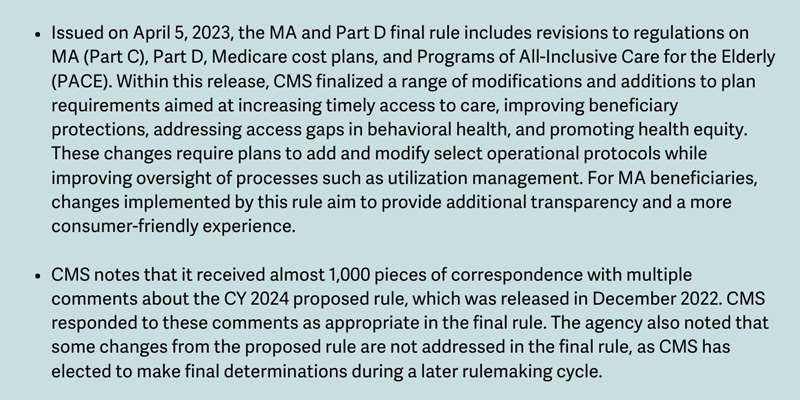
Highlights and Potential Implications

Additional Details
Access and Beneficiary Protections
Utilization Management Requirement
- In response to numerous concerns regarding the use of prior authorization and the effect on beneficiary access within MA, CMS finalized several refinements around how MA plans develop and use coverage criteria and utilization management processes. The rule is designed to give beneficiaries additional protections by ensuring they receive the same access to medically necessary care that they would otherwise receive through traditional Medicare. The rule also requires MA plans to substantiate their policies and implement maintenance processes to ensure consistency. Overall, CMS is finalizing several new requirements, including:
- Requiring that MA plans reference, and make publicly available, evidence or clinical literature when creating internal coverage criteria for situations where no Medicare regulation or National/Local Coverage Determination (NCD/LCD) establishes coverage requirements.
- Implementing a policy that once a coordination care plan grants prior authorization approval, it will remain valid for as long as medically reasonable and necessary.
- Requiring that coordinated care plans only be used to confirm patient diagnoses, or other clinical criteria, and ensure an item or service is medically necessary.
- Prohibiting prior authorization for a minimum 90-day transition period when an enrollee is actively undergoing a course of treatment and switches to a new MA plan.
- Requiring that all MA plans establish a Utilization Management Committee to review policies annually and ensure consistency with national and local coverage guidelines.
Marketing Requirements
- CMS is finalizing proposed action to address potentially misleading marketing, including prohibiting ads that: 1) do not mention a specific plan name, 2) use words and imagery such as the Medicare name or logo, and thus suggest the ads are coming from the government, and 3) may confuse beneficiaries in ways that may be misleading or provide a misrepresentation of the plan.
- CMS is finalizing 17 provisions as originally proposed and approving another 4 with modifications. The 4 approved provisions with modifications include:
- Permitting agents to make business reply cards available at educational events.
- Requiring an agent to tell potential enrollees how many plans are available.
- Extending the length of time agents are able to re-contact beneficiaries to discuss plan options to 12 months.
- Allowing certain exceptions for an agent to meet with a beneficiary without waiting the full 48-hour cooling-off period.
- CMS is not finalizing the proposal to prohibit third-party marketing organizations from distributing beneficiary contact information but may address it in a future rule.
Behavioral Health Access
- To ensure beneficiary access to behavioral health services, CMS is finalizing policies to strengthen network adequacy and reiterate the responsibility of MA plans to provide these services. Specifically, CMS finalized the following changes:
- Adding clinical psychologists and licensed clinical social workers to the list of specialties for which minimum standards will be established and thus be factored into CMS’s evaluation of an MA plan’s network. This change makes these provider types eligible for the existing 10 percentage point telehealth credit.
- Modifying general access to service standards to explicitly include the need for behavioral health services.
- Codifying standard appointment wait times for both primary care and behavioral health.
- Including stabilizing emergency behavioral health services within the category of emergency services that must not be subject to prior authorization.
- Requiring MA plans to notify beneficiaries if a behavioral health or primary care provider is dropped from the network midyear.
- Requiring that MA plans establish care coordination programs that include community, social, and behavioral health services.
Support for Low-Income Beneficiaries under Part D
- The final rule implements certain provisions from the Consolidated Appropriations Act of 2021 and the Inflation Reduction Act of 2022 aimed at providing subsidies and support to low-income beneficiaries.
- The Limited Income Newly Eligible Transition (LI NET) program currently operates as a demonstration to provide immediate and retroactive Part D coverage for low-income beneficiaries who are eligible and do not yet have prescription drug coverage. In this final rule, CMS is making the program permanent within the Medicare Part D program.
- CMS also finalized expanded eligibility for the full low-income subsidy (LIS) benefit under Medicare Part D, also known as “Extra Help,” to individuals with incomes up to 150% of the federal poverty level who meet the eligibility criteria. Beneficiaries who currently qualify for the partial subsidy will now receive the full low-income subsidy beginning January 1, 2024. CMS estimates that this will improve access for 300,000 low-income Medicare beneficiaries.
Quality Programs
Star Ratings Program
- To better align the MA Star Ratings Program with other CMS programs and to continue driving quality improvement, CMS finalized several changes to the Star Ratings Program, including:
- Removing the Part C Diabetes Care–Kidney Disease Monitoring measure beginning with the 2024 measurement year and 2026 Star Ratings.
- Adding the Part C Kidney Health Evaluation for Patients with Diabetes measure and updating the Part D Medication Adherence for Diabetes Medication, Medication Adherence for Hypertension (RAS Antagonists), and Medication Adherence for Cholesterol (Statins) measures.
- Reducing the weight of patient experience and access measures to align with other programs and place additional focus on quality outcomes.
- Removing the 60% rule for extreme and uncontrollable circumstances, also known as the adjustment for disasters.
- Implementing a health equity index (HEI) reward beginning with the 2027 Star Ratings to encourage plans to improve care for those with certain social risk factors. The 2027 rewards would be determined using data from 2024 and 2025 measurement years.
- Except as noted, these changes will apply for the 2024 measurement period and the 2026 Star Ratings.
Other Updates
Enrollee Notification for Contract Termination
- In the interest of putting enhanced requirements around termination notices and to codify best practices, CMS is finalizing a 45-day notice period specific to primary care and behavioral health contract terminations. The rule requires written notice and one attempt at telephonic notice for enrollees who have not opted out of receiving telephonic communication with their MA plan. This is a slight deviation from the proposed rule, which required telephonic notice to all impacted enrollees. This requirement would span enrollees who are currently assigned to or have been a patient of that provider within the last three years.
- CMS also finalized the removal of the “good faith effort” language for enrollee notifications in the case of no-cause terminations. By removing this standard, CMS is clarifying that it will be a requirement to notify enrollees of no-cause provider terminations
Advancing Health Equity
To improve equity for historically underserved and marginalized populations, CMS finalized various refinements to MA plan requirements, including:
- Adding clarification to an existing requirement by expanding the list of populations for which MA plans must provide culturally competent services.
- Requiring MA plans to develop and offer digital health education to enrollees to improve access to covered telehealth benefits.
- Requiring MA plans to include cultural and linguistic capabilities of providers within their provider directories.
- Requiring MA organizations’ quality improvement programs to include efforts to reduce care disparities.
Edited by: Matt Maslin



